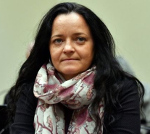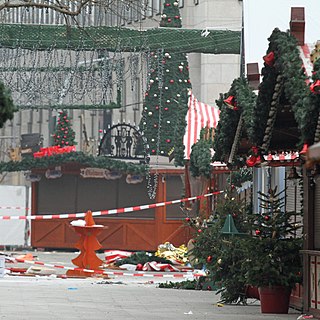Related Research Articles

Cologne is the largest city of the German state of North Rhine-Westphalia and the fourth-most populous city of Germany with nearly 1.1 million inhabitants in the city proper and over 3.1 million people in the Cologne Bonn urban region. Cologne is also part of the Rhine-Ruhr metropolitan region, the second biggest metropolitan region by GDP in the European Union. Centered on the left (west) bank of the Rhine, Cologne is about 35 km (22 mi) southeast of the North Rhine-Westphalia state capital Düsseldorf and 25 km (16 mi) northwest of Bonn, the former capital of West Germany.
In December 2000, an al-Qaeda-linked plot to bomb the Strasbourg Christmas market, at the feet of the Strasbourg Cathedral, on New Year's Eve was discovered. The plot was foiled by French and German police after a terrorist network based in Frankfurt, Germany, the "Frankfurt group", was unravelled. A total of fourteen people were convicted as part of the plot; four in Germany and ten in France, including the operational leader, Mohammed Bensakhria, thought to be a European deputy to Osama bin Laden. The alleged mastermind of the plot was thought to have been Abu Doha, who was detained in the United Kingdom.

On 31 July 2006, two men placed two suitcases filled with bombs on regional commuter trains in Germany. Departing from the central station in Cologne, the bombs were timed to go off near Hamm or Dortmund and near Koblenz, and according to German investigators "would have resulted in the deaths of hundreds of people ... on a much larger scale than the terrorist attacks on London subways and buses in July 2005." However, due to faulty construction, the bombs only failed to ignite, even as the detonators worked. According to the German prosecutor, at the time Germany had "never been closer to an Islamist attack than in this case."

The Historical Archive of the City of Cologne is the municipal archive of Cologne, Germany. It ranks among the largest communal archives in Europe.
Necati "Neco" Arabaci is a Turkish-German businessman, outlaw biker, gangster and high-ranking member of the Hells Angels Motorcycle Club, who was formerly active in Cologne, Germany and now lives in Turkey. In 2002, he was arrested in Germany for pimping, human trafficking, assault, extortion, weapons violations, and racketeering. He confessed during his trial in 2004 and was sentenced to nine years in prison. He was released in 2007 and deported to Turkey.
The 2010 Copenhagen terror plot was a terrorist plot against Jyllands-Posten, the publisher of the controversial cartoons of Muhammad in 2005.

Beate Zschäpe is a German far-right extremist and a member of the National Socialist Underground (NSU), a neo-Nazi terrorist organization. In July 2018, she was sentenced to life imprisonment for numerous crimes committed in connection with the NSU, including murder and arson.

On 9 June 2004, a nail bomb detonated in Cologne, Germany, in a business area popular with immigrants from Turkey. Twenty-two people were wounded, with four sustaining serious injuries. A barber shop was destroyed; many shops and numerous parked cars were seriously damaged by the explosion and by the nails added to the bomb for extra damage. Authorities initially excluded the possibility of a terrorist attack. The bomb, which contained more than 800 nails, was hidden in a travel compartment on a bicycle left in front of the barber shop.

Schauspiel Köln is a theatre and company in Cologne, North Rhine-Westphalia, Germany. It forms together with the Cologne Opera and other houses the Bühnen der Stadt Köln. The listed building has 830 seats in the Grand House, 120 in the locksmith and 60 in the refreshment room. In addition, the listed 'Halle Kalk' has 200 seats, it was used until closing in the summer of 2015 because of the danger of collapse. Since the 2013/14 season Depot 1 and Depot 2 have been used as interim venues during the extensive renovation of the Schauspielhaus on the site of the former Carlswerk in Schanzenstraße in Cologne-Mülheim.

During the 2015–2016 celebrations of New Year's Eve in Germany, approximately 1,200 women were reported to have been sexually assaulted, especially in the city of Cologne. In many of the incidents, while these women were in public spaces, they were surrounded and assaulted by large groups of men who were identified by officials as Arab or North African men. The Federal Criminal Police Office confirmed in July 2016 that 1,200 women had been sexually assaulted on that night.

Wolfgang Albers is a German jurist. From 1 October 2011 to 8 January 2016 he has served as chief of the Cologne police.

Islamic terrorism in Europe has been carried out by the Islamic State (ISIL) or Al-Qaeda as well as Islamist lone wolves since the late 20th century. Europol, which releases the annual EU Terrorism Situation and Trend report (TE-SAT), used the term "Islamist terrorism" in the years 2006–2010, "religiously inspired terrorism" 2011–2014, and has used "jihadist terrorism" since 2015. Europol defines jihadism as "a violent ideology exploiting traditional Islamic concepts".

On 19 December 2016, a truck was deliberately driven into the Christmas market next to the Kaiser Wilhelm Memorial Church at Breitscheidplatz in Berlin, leaving 12 people dead and 56 others injured. One of the victims was the truck's original driver, Łukasz Urban, who was found shot dead in the passenger seat. The truck was eventually stopped by its automatic brakes. The perpetrator was Anis Amri, an unsuccessful asylum seeker from Tunisia. Four days after the attack, he was killed in a shootout with police near Milan in Italy. An initial suspect was arrested and later released due to lack of evidence. Nearly five years after the attack, a man who was critically injured during the attack died from complications related to his wounds, becoming the 13th victim. As of December 2023, this attack remains the worst Islamist terrorist attack by number of casualties in German history.

Hambach Forest is an ancient forest located near Buir in North Rhine-Westphalia, western Germany, between Cologne and Aachen. It was planned to be cleared as part of the Hambach surface mine by owner RWE AG. There were protests and occupations from 2012 against this, and in 2020 a law was passed to preserve it.

On 11 April 2017, the tour bus of the German football team Borussia Dortmund was attacked with roadside bombs in Dortmund, Germany. Three bombs exploded as the bus ferried the team to the Westfalenstadion for the first leg of their quarter-final against Monaco in the UEFA Champions League. One of the team's players, Marc Bartra, and a policeman were wounded, but the strengthened windows of the bus prevented casualties.

On 7 April 2018, a man drove a van into people seated outside restaurants in a pedestrianised square in the old part of the German city of Münster. He killed four people and injured about 20 others, six of them seriously, before committing suicide.

The 2018 Cologne attack was an attack and subsequent hostage-taking that occurred at the central railway station of Cologne, Germany, on 15 October 2018.
In Rhineland-Palatinate, Germany, two police officers were fatally shot at a traffic stop on 31 January 2022. The Public prosecutor's office believes that the two arrested suspects were attempting to cover up their poaching.

Odo Rumpf is a German sculptor working in Cologne.
References
- 1 2 Diehl, Jörg; Schmid, Fidelius (2018-06-13). "Terrorverdacht in Köln: Islamist soll an Biowaffe gearbeitet haben". Spiegel Online. Retrieved 2018-06-16.
- ↑ "Ricin threat: Cologne police search flats". BBC News. 2018-06-15. Retrieved 2018-06-16.
- 1 2 tagesschau.de. "Köln: Verdächtiger wollte offenbar Rizin herstellen". tagesschau.de (in German). Retrieved 2018-06-16.
- ↑ "The June 2018 Cologne Ricin Plot: A New Threshold in Jihadi Bio Terror – Combating Terrorism Center at West Point". Combating Terrorism Center at West Point. 2018-08-08. Archived from the original on 2018-10-27. Retrieved 2018-10-27.
- 1 2 (www.dw.com), Deutsche Welle. "Cologne ricin plot bigger than initially suspected | DW | 20.06.2018". DW.COM. Retrieved 2018-06-22.
- ↑ ONLINE, RP (15 June 2018). "Rizin-Fund in Köln: Polizei durchsucht weitere Wohnungen in Chorweiler". rp-online.de (in German). Retrieved 2018-06-17.
- 1 2 "Kölner Rizin-Fall: Ermittler müssen gewaltige Datenmengen auswerten". Spiegel Online. 2018-07-07. Retrieved 2018-07-13.
- 1 2 Kricke, Sabine. "Rizin-Funde in Köln: Frau des Terrorverdächtigen Sief Allah H. festgenommen". rp-online.de (in German). Retrieved 2018-08-05.
- ↑ (www.dw.com), Deutsche Welle. "German prosecutors: Tunisian planned ricin terror bombing against 'unbelievers' | DW | 03.08.2018". DW.COM. Retrieved 2018-08-05.
- ↑ "German Court Convicts Islamist of Ricin Bomb Plot". The New York Times. Associated Press. 2020-03-26. ISSN 0362-4331 . Retrieved 2020-03-30.
- ↑ Striewski, Markus Schmitz/ Heinz Horst / Frank Gerhardt / Rainer (2018-06-14). "Haftbefehl gegen Tunesier: Rizin-haltige Substanz in Kölner Wohnung gefunden" (in German). Retrieved 2018-06-17.